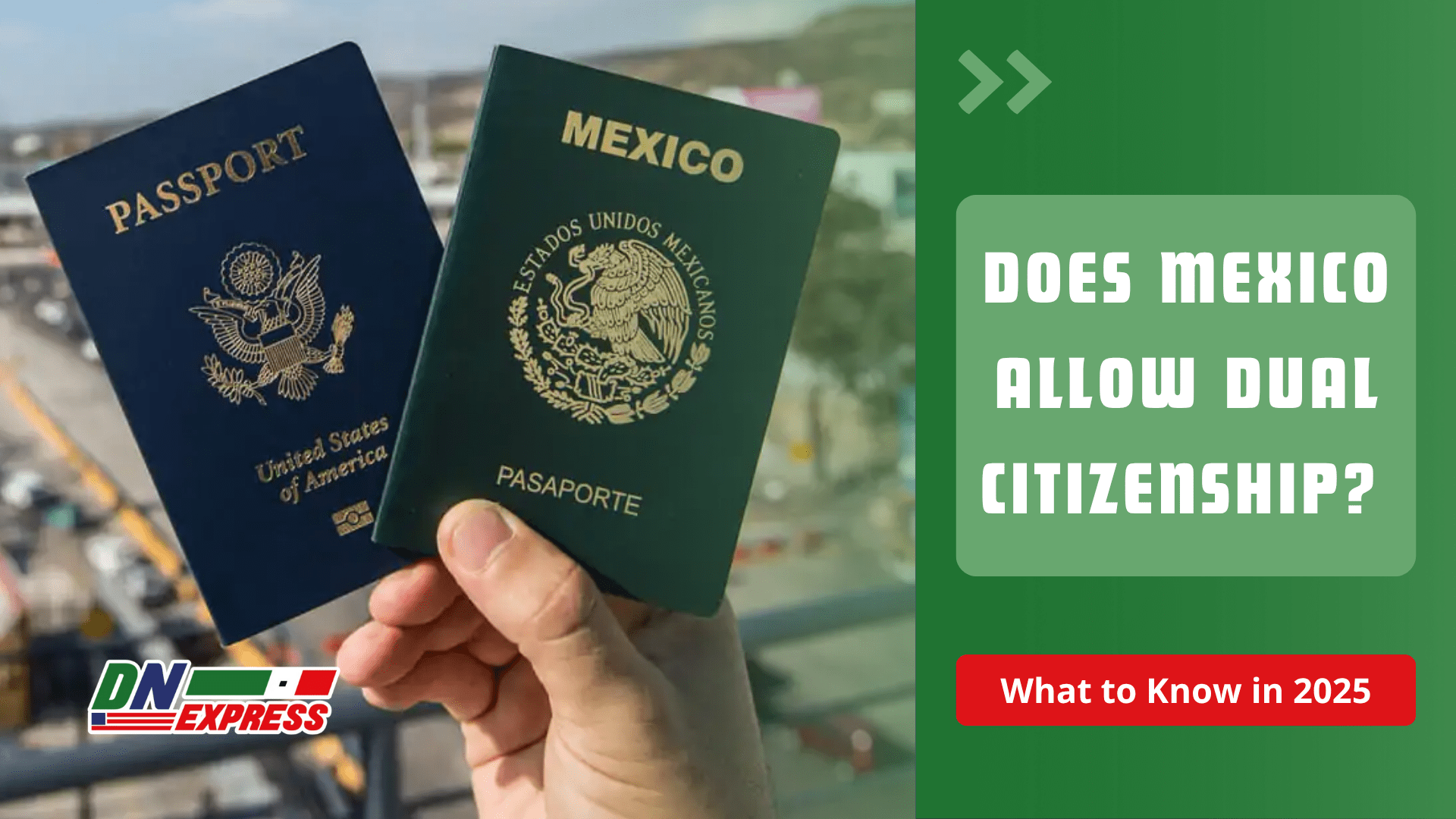
Yes, Mexico allows dual citizenship.
Since 1998, Mexican nationals have been permitted to hold more than one nationality without giving up their Mexican citizenship. That means U.S. citizens of Mexican descent can legally hold both passports, and all the rights that come with them.
Whether you're trying to reclaim your Mexican identity, register your kids, secure inheritance rights, or get around consulate delays, dual citizenship offers a legal and cultural bridge between two countries you call home. And the process is likely easier than you think.
We help families across the U.S. get Mexican citizenship without consulate visits, even if their parent is unavailable, passed away, or they've been told they “missed their chance.” Our legal team gets it done quickly, correctly, and remotely: no headaches, no guesswork.
Want to see if you qualify or how the process works in your situation? We'll break it all down below, from the law itself to how it applies if you're a parent, adult child, grandchild, or someone trying to fix paperwork and finally get your Mexican passport.
What Dual Citizenship Means in Mexico
Dual citizenship in Mexico means that you are legally recognized as a Mexican national even if you also hold another country's citizenship, most commonly, American.
This is fully protected legal right under Mexican law, and it's been that way for over 25 years.
Unlike naturalization (which is how foreigners become Mexican after years of residency), dual citizenship through descent or birthright is your right from the start. And unlike renunciation (where you'd have to give up another nationality), Mexico doesn't make you choose. You can hold multiple nationalities without legal conflict.
The legal basis for this is found in Article 30 of the Ley de Nacionalidad (Nationality Law). It states that all Mexicans, whether by birth or naturalization, retain their Mexican nationality even if they acquire another.
The only condition is that when you are in Mexican territory, you must act as a Mexican citizen. That means entering and exiting Mexico with your Mexican passport, and identifying yourself as such before authorities.
From the U.S. perspective, dual citizenship is permitted, but not encouraged.
The U.S. government doesn't require you to renounce your American citizenship if you gain Mexican nationality. However, you must still follow U.S. laws (like paying taxes), and you'll need to use your U.S. passport when entering or leaving the United States.
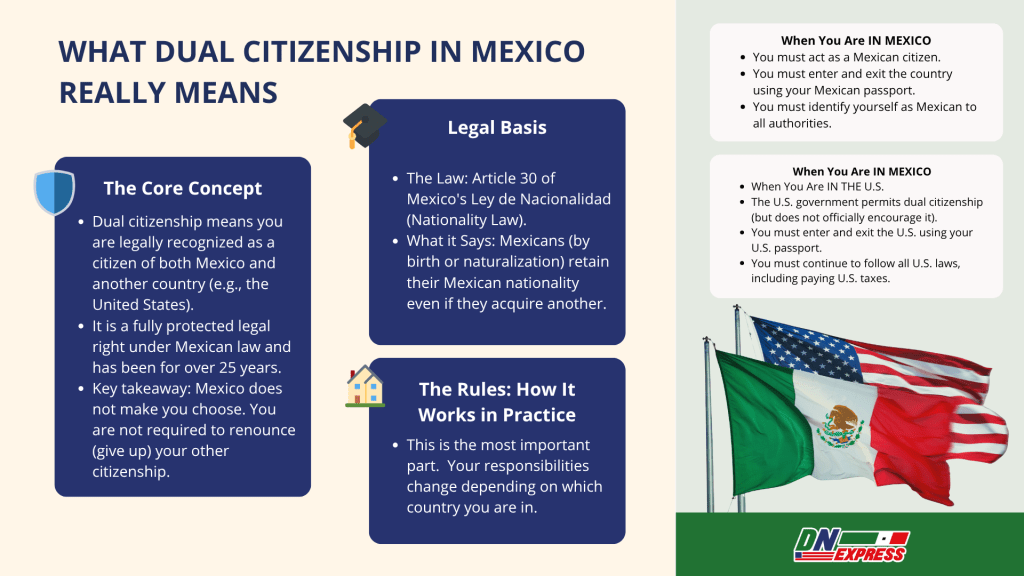
Who Qualifies for Mexican Dual Citizenship?
Mexico recognizes multiple pathways to dual citizenship, depending on your specific family history and legal circumstances.
Whether you're a child of Mexican parents, an adult trying to reclaim your nationality, or a parent looking to pass it down, the route to citizenship is different for each. Here's how it breaks down:
U.S.-Born Children of Mexican Parents
If you were born in the U.S. but at least one of your parents is a Mexican citizen by birth, you are already considered Mexican under Mexican law.
You don't need to naturalize. You simply need to register your birth in Mexico (or through a Mexican consulate), and you'll be issued a Mexican birth certificate.
The process can move forward even if your Mexican parent is deceased, estranged, or unavailable, a misconception that stops many from applying. In fact, DNExpress routinely helps clients in these exact situations using alternative documentation, sworn statements, or historical records.
✅ No consular appointment required
✅ Remote registration available
✅ No residency or Spanish test
✅ Faster approval timelines compared to naturalization
Adults Reclaiming Their Mexican Identity
Many adults think they “missed their chance” because their parents didn't register them in Mexico when they were children.
That's simply not true.
As long as you were born to at least one Mexican parent, you still qualify for dual nationality, even as an adult. This is not a discretionary privilege; it's a legal right. You don't need to live in Mexico, speak Spanish, or go through the naturalization process.
Our team specializes in helping people recover long-lost documents, correct birth records, and finally formalize their Mexican identity, even decades later.
Parents Registering Their U.S.-Born Children
If you're a Mexican citizen (either by birth or through registration), your U.S.-born child qualifies for Mexican nationality through you.
But it's not automatic. You must actively register their birth in the civil registry through a process called the “acta de nacimiento en el extranjero.”
Many parents wonder: “Can I still pass citizenship to my child even if they're a teen or adult?”
The answer is yes, but the earlier you act, the easier it is to gather and submit the required documents.
DNExpress helps families avoid consular backlogs and ensure every generation is legally recognized under Mexican law.
Mexican-Americans Seeking Economic or Legal Benefits
Not everyone applies out of cultural identity; many apply because of practical legal or financial advantages.
As a dual citizen, you can:
- Own property in coastal or restricted areas without a fideicomiso
- Enroll in Mexico's public healthcare system (IMSS or INSABI)
- Avoid tourist visa time limits
- Apply for a second passport, simplifying travel to Latin America and the EU
A question we hear often: “Will I owe taxes in Mexico?”
No. Mexico only taxes you if you live there for 183 days a year or earn income within its borders. If you live and work in the U.S., your dual status has no tax impact.
One rule to remember: Once you're recognized as Mexican, you must enter and exit Mexico using your Mexican passport, not your U.S. one. This ensures you're treated as a national, not a foreign visitor.
5. Families Doing Multi-Generational Citizenship Recovery
In many families, it starts with one person, then spreads.
A son applies, then his mom. The siblings follow. Before long, the whole family holds dual citizenship and all the rights that come with it.
We've helped entire family trees get recognized, sometimes across three generations. We help with coordination, documents, translation, and making sure each relative's case is approached correctly, especially when different last names, missing records, or estranged parents are involved.
For many families, this process goes beyond travel or property. It's about reconnecting with heritage, identity, and each other.
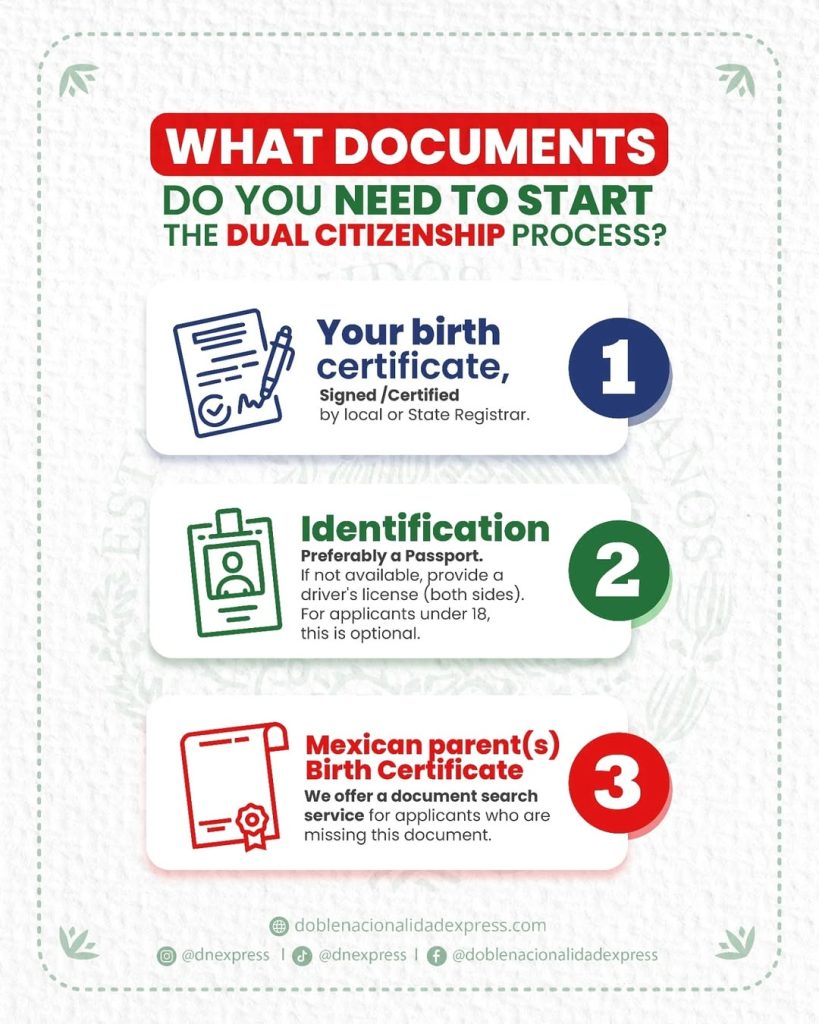
Why Work With Doble Nacionalidad Express?
When it comes to reclaiming your Mexican citizenship, the process should feel empowering, not overwhelming.
But for many families, it's confusing, bureaucratic, and filled with roadblocks. That's where Doble Nacionalidad Express (DNExpress) comes in. We were built to simplify this journey for U.S.-based families, and here's how we do it differently.
What DNExpress Does Differently
We specialize in helping people who thought they were “too late,” “ineligible,” or “stuck waiting on the consulate.”
We've built a fully remote, attorney-led process that works for families, whether you're dealing with missing records, uncooperative parents, or inconsistent documents.
- No consulate appointments needed: We handle registration remotely when possible, bypassing the long waits at consulates across the U.S.
- We fix messy paperwork: From name mismatches to incorrect birth certificates, our legal team corrects the issues that typically get applications rejected.
- You don't need your parent's help: If your Mexican parent is estranged, unavailable, or deceased, we can still help. We build your case using alternative proof and sworn declarations.
- Professional legal guidance: Our bilingual staff includes binational legal professionals, not call center agents, not document translators. We know the law and how to work across both systems.
- Experience with complex cases: Even if you've been denied before, we can often reopen or repair your application. We don't back down from tricky family histories, multiple generations, or identity complications.
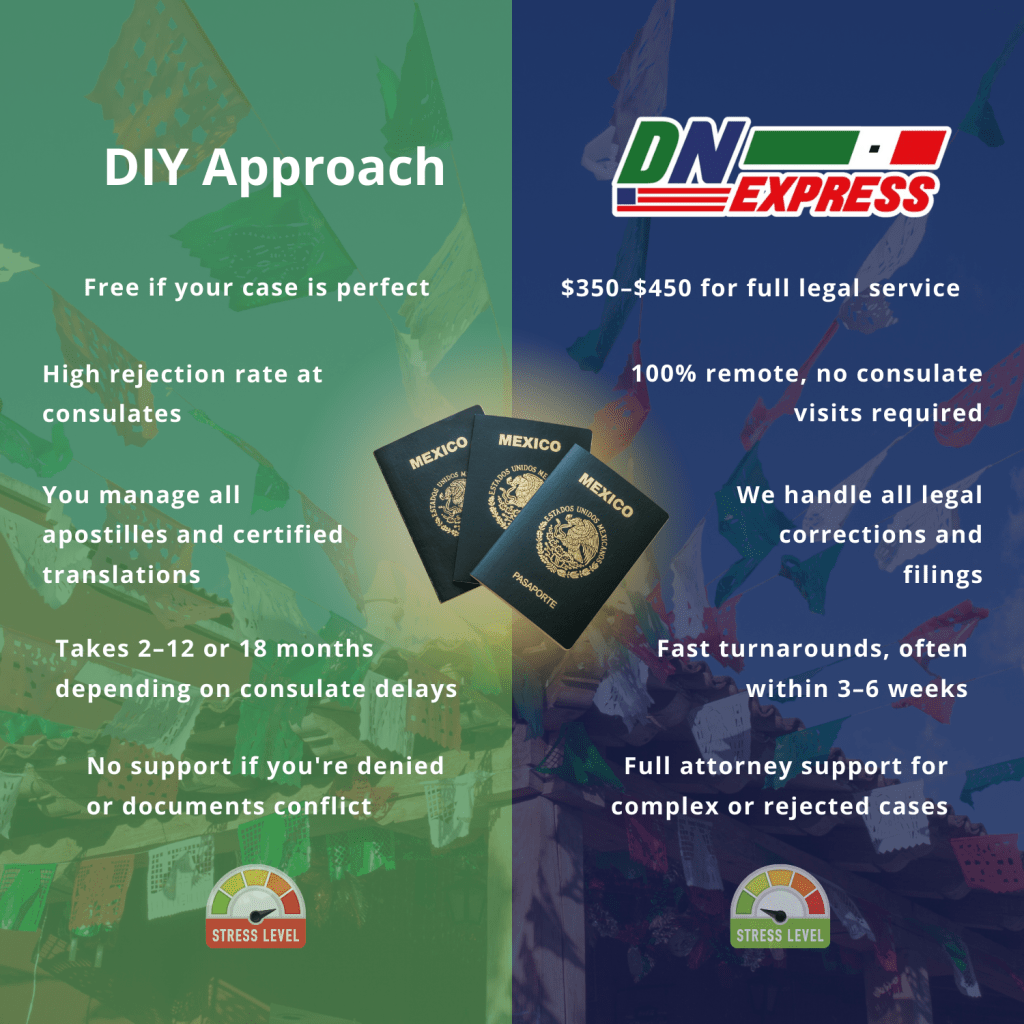
What Happens If You Try to Do It Alone
Many of our clients come to us after trying it alone and hitting a wall.
Here's what we see most:
- Long consulate wait times: Appointments are often booked 6+ months out, and rescheduling is unreliable.
- Incorrect or missing documents: Even small errors in your birth certificate or a mismatched surname can trigger rejection, and there's rarely anyone to guide you.
- No communication or case updates: Most government agencies don't provide status tracking, leaving you in limbo.
- Missed opportunities: We've seen families lose their chance to register a child or meet a legal deadline because of incomplete applications. Mistakes cost time and sometimes, your spot in the process.
With DNExpress, you're not filing paperwork. You're getting full legal support from people who know your culture, your story, and your goals on both sides of the border.
Final Thoughts: Is Dual Citizenship With Mexico Worth It?
For most Mexican Americans, the answer is absolutely yes.
Dual citizenship offers benefits beyond paperwork. It gives you the freedom to live, work, and thrive on both sides of the border. It's a legal safeguard, a cultural connection, and often, a long-overdue acknowledgment of who you've always been.
You don't lose any of your U.S. rights. In fact, you gain additional protections, property rights, healthcare access, and the ability to pass citizenship on to your children. And when done right, the process is smoother and faster than most people expect.
We make that possible by turning a slow, bureaucratic system into a clear, empowering path forward. We believe that every family deserves to be recognized fully, both legally and culturally.
Need Help Claiming Mexican Citizenship?
📱 Call or Message Us on WhatsApp
✅ Attorney-led process. Proven outcomes. Fast service.
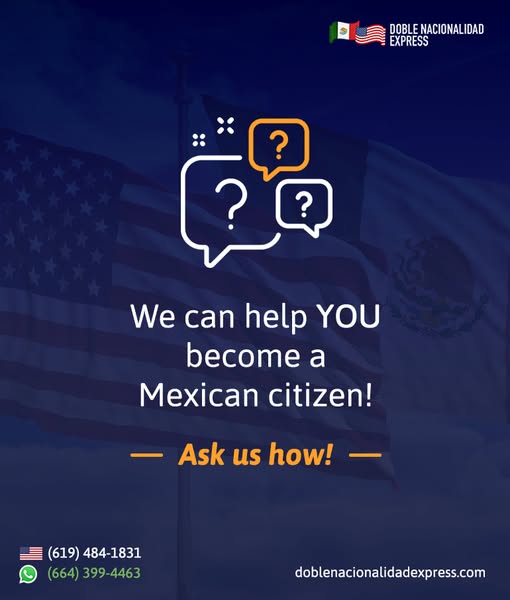
FAQ
Whether you're exploring dual citizenship for cultural, personal, or legal reasons, it's natural to have questions.
Below, we answer the most frequent concerns our clients ask, clearly and honestly.
Can I be a dual citizen of the U.S. and Mexico?
Yes.
Both countries allow dual citizenship, and neither requires you to renounce the other. You can legally hold both a U.S. and Mexican passport, vote in both countries, and claim all the rights associated with each nationality.
Is there a downside to dual citizenship with Mexico?
For most people, there are virtually no downsides.
The two most frequent responsibilities include:
- Using your Mexican passport when entering or leaving Mexico
- Registering for symbolic military service if you're a male under 40 (rarely enforced and mostly ceremonial)
Neither of these obligations affects your U.S. status or travel rights.
Do I have to pay taxes in Mexico?
Not unless you:
- Live in Mexico longer than 183 days a year
- Earn income in Mexico (e.g., rent, business, job)
Mexico follows a residency-based taxation model, so simply holding Mexican nationality won't trigger any tax responsibility. And if you do live in Mexico, you may qualify for tax credits or exclusions under U.S. tax treaties.
Will I lose my U.S. citizenship?
No.
Acquiring Mexican citizenship does not cause you to lose your U.S. citizenship unless you explicitly renounce it at a U.S. embassy and sign formal paperwork to do so. You can live in Mexico, vote there, and still retain full U.S. rights.
Can I live in Mexico and still be a U.S. citizen?
Absolutely.
Many of our clients maintain dual residency. Keep in mind:
- You must obey local laws in each country
- You'll need to use your U.S. passport to enter the U.S. and your Mexican passport to enter Mexico
Dual citizens enjoy maximum flexibility for long-term stays, healthcare access, and property ownership.
What's the 1998 law about dual nationality?
Prior to 1998, Mexico required citizens to renounce other nationalities.
The reform to the Nationality Law in 1998 reversed that policy, allowing Mexican nationals to retain or acquire other citizenships without losing their Mexican status.
This change opened the door for millions of Mexican-Americans to claim dual citizenship legally and permanently.
Does Mexico allow multiple citizenships beyond two?
Yes.
Mexico does not limit the number of nationalities you can hold. You can be a U.S.-Mexican-Spanish citizen, for example, without legal conflict. However, you must use your Mexican identity when dealing with Mexican authorities or within Mexican borders.
Is it expensive to get Mexican dual citizenship?
The cost depends on your route:
- By descent (registro de nacimiento): Usually $100-$200 in government fees
- By naturalization: Around $520 USD as of 2025, plus any document correction or legal translation costs
With DNExpress, you can avoid unnecessary expenses, eliminate guesswork, and ensure your documents are complete the first time.
What qualifies you for dual citizenship?
You may qualify if you meet any of these conditions:
- You were born in the U.S. to at least one Mexican-born parent
- You were born in Mexico
- You are married to a Mexican citizen and meet residency requirements
- You've lived in Mexico long enough to apply for naturalization (usually 5 years)
Even if your parent is deceased or unavailable, you can still apply. DNExpress helps clients navigate exactly these situations every day.



